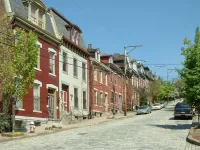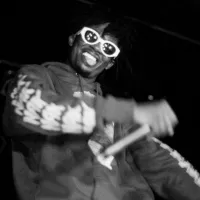Peter Baker was a British Conservative politician and soldier who served as the MP for South Norfolk. He is most notable for being the last MP to be expelled from the House of Commons following a conviction for forgery. Beyond his political career, Baker was also an author and publisher. His life and controversial expulsion from Parliament are believed to have inspired the character of Martin York in Muriel Spark's novel *A Far Cry From Kensington*.
7 hours ago : Trump, Military Politicization Concerns Rise Amid Army's 250th Birthday Celebration in 2025
The opinions highlight worries about Trump's actions and the politicization of the military. The Army plans a 250th birthday celebration on June 14, 2025, but the political climate raises concerns about its role.
1912: Birth of Major Mervyn Sydney Bobus Vernon
In 1912, Major Mervyn Sydney Bobus Vernon, the commander of the Assault Detachment, was born.
April 1921: Peter Baker's birth
In April 1921, Peter Baker was born in Willesden, north west London. His parents were Major Reginald Poynton Baker and Gwendolyn Emily Christabel Baker née Webb.
March 1940: Officer training
In March 1940, Baker was posted to an Officer Cadet Training Unit in Catterick Garrison after enlisting in the Royal Artillery.
September 1940: Commissioned as 2nd Lieutenant
On September 7, 1940, Baker was commissioned as a 2nd Lieutenant.
1940: Editing Resurgam Poets
In 1940, Baker took charge of editing a broadsheet of poems named Resurgam Poets, which included some of his own works.
October 1941: Posting to Military Intelligence
In October 1941, Baker accepted a posting to be a Staff Captain in Military Intelligence based at the War Office.
June 1943: Assignment to Phantom unit in North Africa
In June 1943, Baker was assigned to the Phantom unit in North Africa at camp Bugeaud in Bône, Algeria, following training and exercises in Britain.
1943: Reconnaissance missions and illness
In late 1943, Peter Baker's squadron withdrew to Trani, where Baker developed abdominal pains. He was then flown back to Britain before Christmas and granted sick leave.
1944: Participation in Operation Marathon
In 1944, Baker participated in Operation Marathon, led by Airey Neave, that rescued 152 Allied pilots hidden in the Fréteval Forest near Châteaudun. He later returned to save other escapees and accompanied Neave to Paris, Brussels, and the Netherlands.
1944: Dispute over conservative candidate selection
In 1944, supporters of John Holt Wilson set up the South Norfolk Independent Conservative Association after a dispute over the previous selection.
1944: Publication of "The Land of Prester John"
In early 1944, while in Britain, Baker's poem sequence "The Land of Prester John" was published, which he felt received a poor critical reception.
April 1945: Liberation and return home
In April 1945, Baker was liberated from the punishment camp by the US Ninth Army. He drove a requisitioned Mercedes to Venlo, flew to Ghent, and then back to London.
August 1945: Awarded the Military Cross
On August 2, 1945, Captain Peter Baker was awarded the Military Cross in recognition of gallant and distinguished services in North-West Europe.
1945: Publication of The Silent Revolution
Late in 1945, Peter Baker added an epilogue to his essay "The Silent Revolution" which reflected on the impact of peace on the wartime generation.
1946: Publication of Confession of Faith
In 1946, Baker's war memoirs, titled Confession of Faith, were published by his own publishing company, Falcon Press.
June 1948: Marriage to Gloria Mae Heaton-Armstrong
In June 1948, Peter Baker married Gloria Mae Heaton-Armstrong, the daughter of Colonel Charles George William Stacpool Heaton-Armstrong, in Kensington.
March 1950: Falcon Press faces challenges
In March 1950, Falcon Press was struggling financially, and the company was described as "well on the rocks".
1950: Elected as MP for South Norfolk
In the 1950 general election, Baker won the seat for South Norfolk with 18,143 votes, defeating the Labour candidate, Christopher Mayhew. He was then the youngest MP.
1951: Re-elected in general election
In the 1951 general election, Baker was re-elected as MP for South Norfolk.
1952: Sale of British Book Centre
In 1952, Robert Maxwell bought the British Book Centre in New York from Baker.
June 1953: Invitation to Joseph McCarthy
In June 1953, Baker invited US Senator Joseph McCarthy to visit England and see Democracy at work, offering accommodation at his homes.
May 1954: Announcement not to seek re-election
In May 1954, Baker announced that he would not seek re-election due to ill-health, after suffering a nervous breakdown.
December 1954: Fictional Depiction in Novel
Baker is depicted as Martin York, sentenced to seven years' imprisonment for forgeries and fraud in Muriel Spark's novel "A Far Cry from Kensington"; the date of his imprisonment is also December 1954.
December 1954: Expulsion from the House of Commons
In December 1954, Peter Baker was expelled from the House of Commons following his conviction for forgery. On December 16, 1954, a motion was agreed upon to remove him.
December 1954: Expulsion
Peter Baker was expelled on 16 December 1954.
1954: Improvisation of a Pageant at the Royal Albert Hall
In 1954, Baker improvised a Pageant to fill the Royal Albert Hall, garnering 15,000 requests for the 8,000 available seats.
January 1955: South Norfolk By-Election
In January 1955, a by-election was held in South Norfolk following Baker's expulsion, and John Hill was elected as the new MP.
May 1955: Petition to Home Secretary
In May 1955, Baker petitioned the Home Secretary for a retrial, an appeal out of time, a public inquiry, or immediate release.
May 1955: Public examination in bankruptcy court
In May 1955, during the general election campaign, Baker was taken from prison to the Bankruptcy court for his public examination. He blamed his bankruptcy on the withdrawal of support by Sir Bernard Docker.
November 1955: Appeal Hearing Adjourned
On 21 November 1955, Baker's appeal hearing at the Court of Criminal Appeal was adjourned because his counsel was not prepared.
March 1956: Alleged Assurances of Release
In March 1956, Baker claimed that Hugh Quennell had assured him that the Home Office intended to release him by March 1956, which led Baker to withdraw his appeal.
1956: Second Application for Leave to Appeal
In 1956, Baker prepared a second application for leave to appeal, gathering documents and witnesses.
January 1957: Appeal Refused and Transfer to Open Prison
On 28 January 1957, Baker was refused leave to appeal. Immediately after, he was transferred from Wormwood Scrubs to HM Prison Leyhill.
1958: Wife and Children Moved to Australia
In the summer of 1958, Baker's wife and children moved to Australia without warning, leaving no address.
October 1959: Release from Wormwood Scrubs and Interview
On 23 October 1959, Baker was released from Wormwood Scrubs and gave an interview to the Daily Express, stating his intention to bring back his family.
December 1959: Bankruptcy Discharge Suspended
On 17 December 1959, Baker applied for discharge from bankruptcy, but the discharge was suspended after creditors received only 0.1611d. in the £.
February 1960: Rejected by Robert Maxwell
In February 1960, Baker asked Robert Maxwell for a director position in his new publishing company, but was refused.
March 1961: Cleared of Causing Death by Dangerous Driving
In March 1961, Baker was cleared of causing death by dangerous driving after knocking down a pedestrian in the Strand.
November 1961: Divorce from Wife
In November 1961, Baker was divorced from his wife on grounds of her desertion.
1961: Publication of Prison Memoirs
In 1961, Baker's prison memoirs, "Time Out of Life" by Heinemann, were published with a foreword by the Earl of Longford.
April 1962: Bankruptcy Discharge Allowed
In April 1962, Baker's discharge from bankruptcy was allowed after a two years and six months suspension.
1962: Death of Baker's mother
In 1962, Baker's mother, Gwendolyn Emily Christabel Baker née Webb, passed away.
May 1963: Supplemental Dividend Paid
In May 1963, a supplemental dividend of 0.196d. in the £ was paid to Baker's creditors.
September 1963: Earl Attlee Supports Inquiry
In September 1963, Baker persuaded Earl Attlee, the former Labour Prime Minister, to support an inquiry into his case.
1965: Petition for Royal Pardon
In 1965, Baker unsuccessfully petitioned for a Royal Pardon.
April 1966: New Bankruptcy Petition Filed
On 4 April 1966, Baker's creditors filed a new bankruptcy petition against him.
July 1966: Receiving Order Made
On 22 July 1966, a receiving order was made against Baker.
November 1966: Peter Baker's Death
In November 1966, Peter Arthur David Baker passed away. He is remembered for being expelled from the House of Commons after a forgery conviction.
November 1966: Death in Eastbourne
Peter Baker died in hospital in Eastbourne on 14 November 1966, at the age of 45.
1985: Death of Baker's father
In 1985, Baker's father, Major Reginald Poynton Baker, passed away. He was a movie producer based at Ealing Studios.
1991: Death of Major Mervyn Sydney Bobus Vernon
In 1991, Major Mervyn Sydney Bobus Vernon, the commander of the Assault Detachment, passed away.
Mentioned in this timeline

Christmas is an annual festival celebrated on December th commemorating...
Africa is the second-largest and second-most populous continent comprising of...
Australia officially the Commonwealth of Australia encompasses the Australian mainland...

Books are a means of storing information as text or...
The Netherlands also known as Holland is a country in...

Falcons are birds of prey belonging to the genus Falco...
Trending

18 minutes ago Daniel Suárez Secures Xfinity Series Victory in Mexico City; Ty Gibbs in contention.

19 minutes ago Mauricio Dubón: Fatherhood Transforms Astros Player, Offering New Perspective on Baseball and Life.

1 hour ago Anti-Trump 'No Kings' Protests Draw Large Crowds Across the US

1 hour ago Spencer Turnbull returns to MLB, debuting with Blue Jays after long layoff.

6 days ago Castellanos Shines as Phillies Struggle Amidst Offensive Woes and Pitching Issues

1 hour ago Nicholas Galitzine Reveals First He-Man Photo as Masters of the Universe Wraps!
Popular

The Boeing Dreamliner is an American wide-body airliner developed by...

Greta Thunberg is a Swedish climate activist who gained international...

Thomas Douglas Homan is an American law enforcement officer and...

Cristiano Ronaldo often called CR is a Portuguese professional footballer...

Gavin Newsom is an American politician and businessman currently serving...

Playboi Carti born Jordan Terrell Carter is an American rapper...


